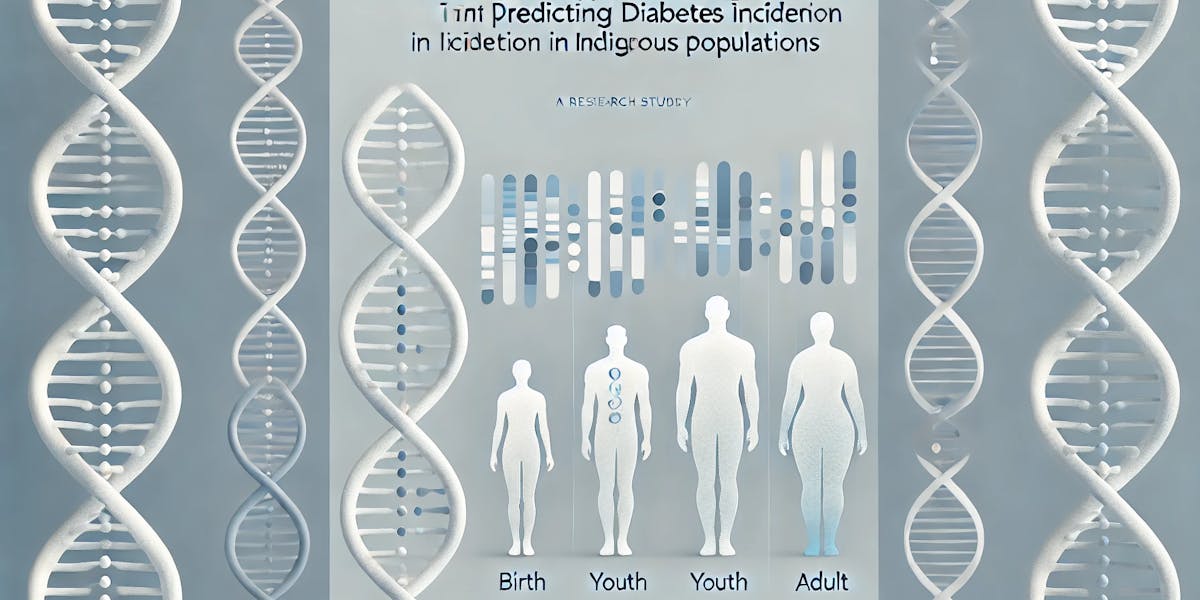Polygenic Score for T2D Prediction in Indigenous Cohorts
Diabetologia

Summary
This study evaluates the contribution of polygenic scores (PS) based on genome-wide association studies (GWAS) in predicting the incidence of type 2 diabetes among Indigenous populations in the Southwestern USA. The research focuses on three distinct cohorts: birth, youth, and adults. Results show that the PS, constructed from European-ancestry GWAS data, significantly enhances predictive accuracy when combined with clinical variables such as BMI, HbA1c, and fasting plasma glucose (FPG). Furthermore, the study highlights that genetic effects on diabetes risk are more pronounced in younger age groups, indicating that early-life genetic screening could aid in preventive strategies. The decision curve analysis revealed that adding PS information can improve risk stratification and guide preventive interventions, especially in populations where clinical predictors are limited.
Study Design
Interventions
Study Type
Outcomes
Duration and Size
Study Population
Age Range
Sex
Geography
Other Criteria
Methodology
The study utilized a longitudinal design involving 7701 genotyped participants from an Indigenous population. Three cohorts were analyzed, with genotypic data imputed against whole genome sequence data. PS construction involved selecting significant genome-wide variants.
Statistical analyses included Cox regression, ROC curves for AUC assessment, and NRI calculations. Decision curve analysis assessed the clinical utility of incorporating PS into risk prediction models, showing improved prediction in younger cohorts.
Interventions
The intervention involved calculating polygenic scores for type 2 diabetes using various GWAS-derived variant sets. The DIAGRAM 2018 PS showed the highest predictive value across cohorts.
Key Findings
The DIAGRAM 2018 PS significantly improved type 2 diabetes risk prediction when combined with clinical variables. Genetic factors were more predictive in younger cohorts, suggesting early screening benefits. The most notable improvements were observed in the birth cohort.
Comparison with other Studies
Compared to previous European-ancestry studies, this research highlighted the effective cross-population application of PS. The study underscores PS's potential for broader applications in diverse populations, especially for early risk identification.
Journal Reference
Wedekind LE, Mahajan A, Hsueh WC, et al. The utility of a type 2 diabetes polygenic score in addition to clinical variables for prediction of type 2 diabetes incidence in birth, youth and adult cohorts in an Indigenous study population. Diabetologia. 2023;66(4):847-860. doi:10.1007/s00125-023-05870-2
Related and Discussions
The utility of a type 2 diabetes polygenic score in addition to clinical variables in an Indigenous population
A Polygenic Score for Type 2 Diabetes Improves Risk Stratification and Predicts Future Diabetes
Polygenic risk scores predict diabetes complications and their response to intensive blood pressure and glucose control
Development and validation of a trans-ancestry polygenic risk score for type 2 diabetes in diverse populations
The utility of a type 2 diabetes polygenic score in addition to clinical variables in an Indigenous population
Type 2 Diabetes Polygenic Score Predicts the Risk of Glucocorticoid-Induced Hyperglycemia
Genome-Wide Polygenic Risk Score Predicts Incident Type 2 Diabetes in Women With History of Gestational Diabetes
Development and validation of a trans-ancestry polygenic risk score for type 2 diabetes in diverse populations
The addition of a type 2 diabetes polygenic risk score to family history enhances predictive ability
Integrated clinical risk prediction of type 2 diabetes with a multifactorial polygenic risk score
Researchers use multi-ancestry GWAS data to identify clusters of polygenic scores related to type 2 diabetes development
Our study suggests that a type 2 diabetes polygenic score can help identify those at higher risk earlier
Stay informed. Stay ahead.
Subscribe now for the latest breakthroughs, expert insights, and cutting-edge updates in diabetes care—delivered straight to your inbox.